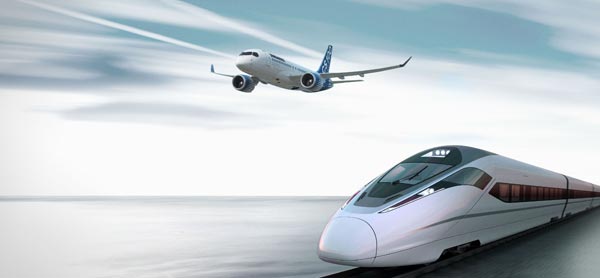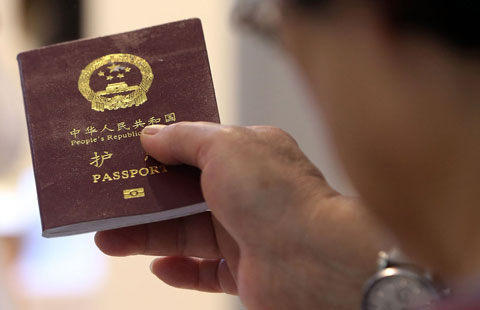Bombardier: engine of Sino-Canadian relationship
Updated: 2014-12-12 00:02
By Wang Ru in Beijing(China Daily Canada)
|
||||||||
 |
|
Bombardier's ZEFIRO-C series provide the latest in high-speed transport. Provided to China Daily |
Fifteen years ago, when Zhang Jianwei was sent by his company from Montreal, Canada, to explore business in China, few people in China knew about Bombardier, and some people tried to find the meaning of "Bombardier" in English-Chinese dictionary, "Bomb…bardier? What does your company make? Bombs?" Zhang, recalled a Chinese client asked after hearing about Bombardier, the Canadian transportation and aerospace giant.
For the record, Bombadier is the world's third largest civil aircraft manufacturer and the largest business aircraft manufacturer.
In 1999, Zhang was the only Bombardier employee, named "representative" of Bombardier in China. He did not have an office, but installed his temporary office in his six-year-old daughter's room, staying up at night, calling Montreal to report. His daughter complaint about keeping her up. Months later, after he'd moved his own office in a new residence, she came to his door, unable to sleep, asking him to calling Montreal in French, which had become her lullaby.
Today, sitting in the meeting room of Bombardier China headoffice in a skyscraper in Central Business District in Beijing, Zhang now leads the company which has seven WFOE (Whole Foreign Owned Enterprises) and five joint ventures and more than 4,000 employees in China.
From the high altitude railway, known as the snow-covered line, to the automated people-mover at Terminal 3 of the Beijing Capital International Airport, and Wuhan-Guangzhou and Beijing-Shanghai high-speed, Beijing-Guangzhou high speed railways, till metro lines in a number of cities, the Canada-based company played an important role behind the development of China's rail and urban mass transit.
In rail transportation, Bombardier's long presence in China has generated orders for more than 5,000 railway passenger cars, more than 10,000 metro cars and more than 560 electric locomotives to date.
The company accounts for one third of the business jet fleet in China with 111 delivered aircrafts and hundreds in backlog. Six airlines operate 47 Bombardier commercial aircrafts in China now.
 |
|
Zhang Jianwei, president of Bombardier China |
"People often attribute that (to the fact) I know China (very well)," said Zhang, who was born in East China's Shandong province and left China to study in Montreal in 1987. "But I often feel that I don't know China -- the country and its industries have changed so fast with growing diversity."
Zhang said the primary factor is to understand and meet customers' needs.
"Bombardier has been gaining customers' trust and market reputation through our persistent efforts," he said. "Many problems in the negotiation and cooperation between Chinese and foreign enterprises are not conflicts of interests in a real sense, but the problems arising from misunderstanding and lack of communication. The only solution is to resort to mutual respect and increased exchange of ideas," said Zhang.
During the APEC meeting in November in Beijing, with Chinese Premier Li Keqiang and Canadian Prime Minister Stephen Harper present, Bombardier Commercial Aircraft and China's sole specialized regional airline, China Express Airlines (China Express), announced a deal worth approximately $727 million for the purchase of 16 CRJ900 NextGen regional jets.
Domestic Chinese railway producers like China North Rail (CNR) and China South Rail (CSR) have caught up and become strong competitors in recent years.
"For Bombardier, they are competitors but also partners, cooperation and competition coexist," said Zhang.
The Changchun-based joint venture between Bombardier and CNR is supplying metro cars to Singapore, and Bombardier has inked a cooperative agreement with China Railway for tapping the international high-speed railway market.
Bombardier has also established global market-oriented partnership with Aviation Industry of China and Commercial Aircraft Corporation of China.
Still, technology transfer has remained a sensitive topic in the global media.
"In the Western media, many Western business leaders claim that they would never transfer any technology to China, but when they are sitting in front of the Chinese government and partners, they talk a lot about technology transfers. As a matter of fact, they tell the truth in neither case," said Zhang. "The collaboration between Bombardier and China has gone beyond technology transfer."
Zhang continued: "We develop the technologies and products most suitable in China with Chinese partners, because technology transfer alone can't fundamentally improve the products. The most advanced train running in high plateaus has been developed by Bombardier's joint venture in China," he noted.
Zhang suggested China seek more cooperation opportunities with Canadian business world because Canada has many high-tech companies, and especially, Canada has many the small and medium-sized companies which have an excellent entrepreneurship, being creative, innovative and having a risk-taking attitude.
"China and Canada have a great complementary bilateral cooperation in technology, particularly in the field of civil aviation, rail transportation and energy industries," said Zhang, "Canada has also the world-leading education systems, in high education, professional and technical training. For example, some Canadian universities have special aviation MBA program, and there are also many colleges in Montreal training professional technicians in the field of civil aviation."
Zhang believes that Canada and China have a big potential in business cooperation and also in culture exchange.
wangru@chinadaily.com.cn

 Momo set for IPO debut in US
Momo set for IPO debut in US
 Despite sales slump, fast food moves ahead in China
Despite sales slump, fast food moves ahead in China
 Jade carvers, experts find a forum in Canada
Jade carvers, experts find a forum in Canada
 BC promotes eco-tourism in China
BC promotes eco-tourism in China
 Getting to know emperors through their stuff
Getting to know emperors through their stuff
 Chinese passport opens more doors in 2014
Chinese passport opens more doors in 2014
 China faces: Glimpses of life and love
China faces: Glimpses of life and love
 Top 10 favorite gift brands of rich Chinese women
Top 10 favorite gift brands of rich Chinese women
Most Viewed
Editor's Picks

|

|

|

|

|

|
Today's Top News
Goal: coal to synthetic gas
Chinese brands face growth hurdles
Despite sales slump, fast food moves ahead in China
Jade carvers, experts find a forum in Canada
BC promotes eco-tourism in China
BC finding new market in China
Construction bank adds Toronto site
Envoy: China trade a priority
US Weekly

|

|







